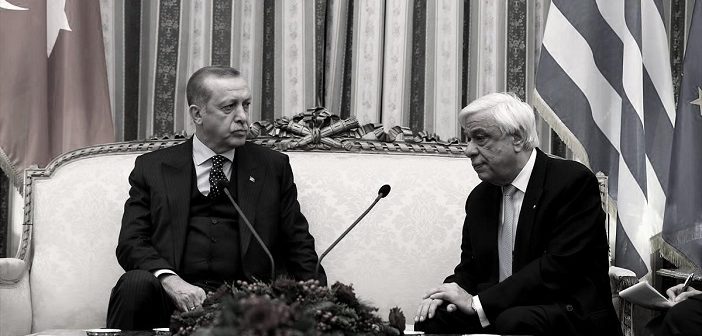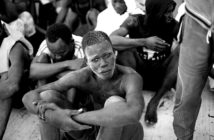The scene is rather recent: President Recep Tayyip Erdoğan of Turkey, during the December 2017 visit to neighbour Greece is having his first meeting with his host, President Prokopis Pavlopoulos. He is ostensibly occupying most of the sofa, leaving Pavlopoulos squeezed into a corner.
At some stage Pavlopoulos feels compelled, in the most diplomatic way possible to say that as a law professor, he thinks it was impossible to modify the 1923 Treaty of Lausanne that settled the international borders of modern Turkey with its neighbours, among them Greece.
Irritated, Erdoğan says he could not let this go unanswered. “I am not a law professor, but I know political law well. In political law, specifically with treaties they require to be updated, and we will do this … We have suffered a great deal, which is why we are changing our system. With the 2019 presidential elections, we will change our system”, he utters.
* * *
At the first glance the so-called “political law” sounds like an oxymoron. Nevertheless the outburst betrays about Erdoğan’s way of thinking. He doesn’t engage in empty talk, he actually means it.
Four points.
First, in Erdoğan’s mind, there is nothing more legitimate than a politician winning a majority. What matters is the rule of majoritarian politics not the law.
Second, in his parochial political concept, the keystone is the rejection of the separation of powers. Accordingly, political administration or the executive cannot be separated from the judiciary. In the so-called “political law”, the politics rule the law.
Third, because he sees politics above everything else, and the law to be shaped according to the needs of politics he throws the entire legal system into the “political trash can”. Like he does every single day! As he makes the people suffer every single day.
And the example he gives to substantiate its “political law” is very telling: the obligation to force “his” tailor-made presidential system to the existing constitutional system. As Turkey is practicing every single day!
Fourth, the foundation of the so-called “political law”: the extra-legality.
The extra-legality? Let us look more closely at this…
Turkey, since its foundation in 1923 and, specifically since 1945, has been trying to become a nation ruled by law. As of 2013, Turkey began losing the characteristics and attributes of a country ruled by law. On April 16, 2017, the nation completely gave up this dream when it voted in a referendum in favour of an executive presidency without checks or balances. It is an elected dictatorship.
The sea-change is not just about the rulers’ disrespect for the rule of law; it has to do with the establishment of a new regime in Turkey. To better understand this nuance, I want to reference again an article by Kemal Gozler, a constitutional law scholar.
Gozler’s article, Can Parliament Make a New Constitution? carried weight during the discussions regarding the (failed) attempt to draft a new constitution after the 2011 parliamentary elections. While discussing under which conditions parliament could draft a new constitution, he was pointing at a major difference between a primary constituent power and a derived constituent power. Let’s start.
“Very broadly, the primary constituent power is a power entitled to make a new constitution and the derived constituent power is a power to make changes in an existing constitution. The primary constituent power is an extra-legal power.
This power occurs in case of a legal vacuum. Such vacuum is either there right from the beginning or is created afterwards (ex-post).
If the vacuum is there at the beginning the primary constituent power makes a brand new constitution. In this case there is no precedent constitution. Thus the primary constituent power didn’t abolish an old chart; it simply took advantage of the existing legal vacuum. In this case the constitution made by primary constituent power is the first constitution of the country. Such legal vacuum appears in colonies gaining independence, merging independent states or states emerging from larger states.
As for the ex-post legal vacuum, the primary constituent power first abolishes the existing constitution, thus it creates a legal vacuum and then fills the vacuum with a new chart.
In this case there in no new state to be set up but a renewal of an existing one. Similarly the new chart is not the first constitution of that state. Such legal vacuum arises when revolutions, coup d’états and civil wars occur. The primary constituent power which emerges out of this kind of situation abolishes the existing regime, its constitution and creates a legal vacuum. Then fills it with a new constitution. The primary constituent power doesn’t create a new state; it renews the state and changes the political regime.
The primary constituent power has two characteristics. It is extra-legal and has no limits. As for the extra-legality, this power functions in a legal vacuum. Before making a new constitution it creates this very vacuum by abolishing the existing constitution. Then it drafts a brand new constitution (ab initio) free of being bound by any legal rule.
And secondly the primary constituent power has no limits. Such power emerges in extraordinary situations when revolutions, coup d’états occur. It overrules the existing regime and abolishes the constitution. Yet, there is no legal provision or authority to restraint this power. In fact, if such legal provision or authority exists to restrain the primary constituent power, it could not be considered as primary constituent power. A primary constituent power is the highest authority which functions with no boundaries and legal restrictions.”
This is crystal clear. Erdoğan’s power is acting as a primary constituent power thanks to the legal vacuum he strives to create since 2013. His argument is the failed coup d’état of 15 July 2016.
His primary constituent power that started to emerge in 2013 out of nothing, has been consolidated with the failed coup d’état but has, in the meantime, managed to abolish the previous political regime, to negate the 1982 Constitution and to create a legal vacuum.
And now he is filling the legal vacuum with “his” constitution. The regime, as it is always uttered is not building a new state; it’s renewing the creation of the state (New Turkey) by changing the regime.
* * *
As we have witnessed the last five years, Erdoğan’s primary constituent power is both extra-legal and limitless.
It ought to be extra-legal as it can function only in a legal vacuum. To create a new constitution, he decided to avoid the 1982 Constitution and create a deeper legal vacuum. No longer bound to any existing constitution, law, or check and then he can freely write a brand-new constitution from zero.
Thanks to the civil coup d’état initiated following the failed military coup d’état of 15 July 2016 there remains not a single legal rule to limit his primary constituent power. Today his primary constituent power is the uppermost and limitless power.
So, this is the great challenge which lies under his “political law”.
And again, so it is the difficulty, not to say the impossibility, of legally fighting a regime created by “political law”.




